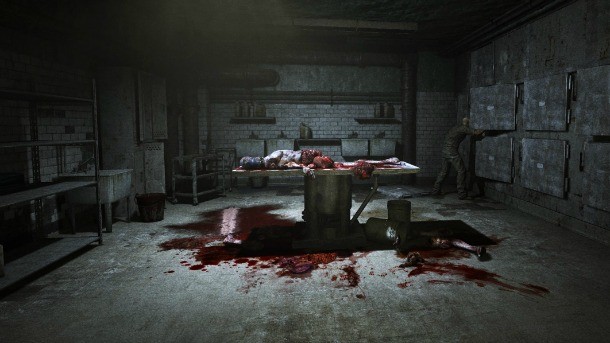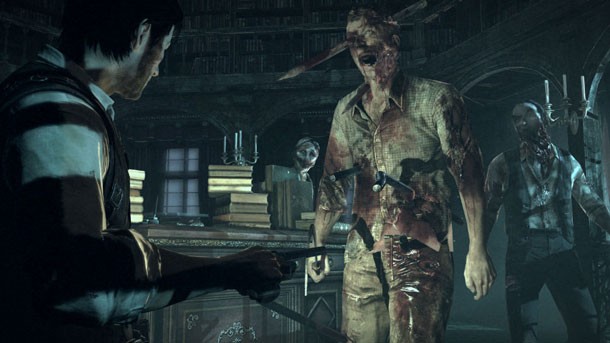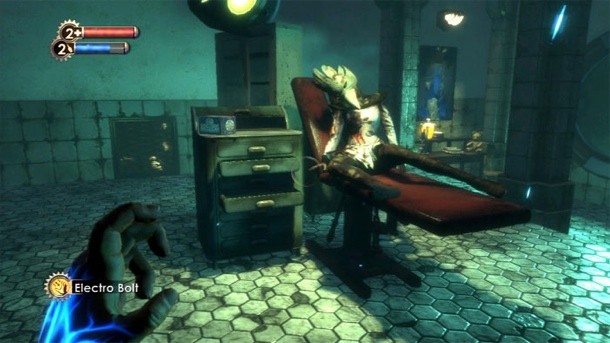Please support Game Informer. Print magazine subscriptions are less than $2 per issue
How My Dislike Of Horror Games Taught Me About What I Love To Play

This month is a boon for horror fans, with the release of Alien: Isolation this week and The Evil Within in just a few days. There is excitement among our readership for both, and though I'm not personally enthusiastic for either, thinking about why that is helped me learn more about the reasons I pick up a controller and invest my time in gaming.
My disconnect with the horror genre isn't about scares, I can handle those and often find myself giggling about my dumb reactions right after they happen. It's not about challenge, which I delight in. And it's certainly not about gore, as over-the-top violence found in many modern games is so ludicrous it often makes me laugh.
It's not even about the individual mechanics used in horror titles that I’ve played. Supplies are often scarce, cowering in the shadows is a viable strategy as you let the unbeatable monster pass you by, and trial-and-error wraps the entire experience together.
By themselves, these tools are used in other genres. Limited supplies in The Last of Us were used to craft weapons and healing items, but Joel was still powerful enough to overcome most encounters. And there were certainly times when instant death by clicker was a real threat.

Sticking to the shadows is something I enjoy in stealth games, and I’ve savored in series, such as Metal Gear Solid, Dishonored, and Assassin’s Creed. I will often choose the sneaky route, and even in bloodbaths like Wolfenstein: The New Order, I tried to keep things quiet.
I’m the kind of gamer that restarts or loads saves to execute on perfection, too. Trial and error doesn’t bother me, and I’ll often impose it on myself even if unnecessary.
So what is it about horror games that keeps me at arm’s length? Terror-filled games succeed by making the player feel powerless. I play games as an escape from the things in life over which I have no control, and I can't derive much enjoyment from putting myself in situations like that during my limited leisure time. I don’t mind working for a sense of mastery, but that’s not something that typically ever comes in horror games. Though through one that pivots, I was able to learn the most about my tolerance for scares.
BioShock is a perfect example of a game that morphs through the experience. As I look back on my first encounter with it, I recall slowly prowling the medical ward.
Medical horror is particularly disturbing for me, and using that setting to introduce the Splicers was a brilliant stroke. Anyone who has played it will likely remember the dentist’s office encounter, which epitomizes the way games can toy with players in a horror setting.
Upon walking in, the room fills with mist and as it clears, a splicer is in the dentist chair. I fell for it and unloaded a couple of precious rounds into the corpse.

After realizing that the body was never a threat, I continued to explore the room. In a corner is a safe, one of the first experiences with the Pipe Dream-style hacking minigame. The distraction is perfectly timed, because it takes you out of the setting entirely.
Solving the puzzle opens the safe and rewards you with cash and other items. It’s then that Irrational plays its meanest trick. Turning around reveals a splicer that is as close as possible to your face. I can’t recall if it reacted first or I did, but I know I fumbled to put the mangled addict down.
Few moments in games stick out in my memory as vividly as that one. And I’m not sure I would adore BioShock as much without it. I’m also not sure I would have finished the game if it were like that the entire way through.
It’s not too much further into BioShock that things change significantly. Players can start to stockpile ammunition, upgrade weapons, and turn Rapture’s defenses against the splicers.
Jump scares still find their way into the experience, especially later as “dead” splicers start to pick themselves up from the floor. But the feeling of powerlessness dissipates. The playing field becomes level and even Big Daddies become manageable (especially if you set up trap bolts in advance).
It’s important to draw a distinction between “feeling powerful” and “challenge.” This isn’t about difficulty, because there are different elements that determine whether a game is “hard” or not.
Pushing through a tough firefight in a game can be extremely difficult and still be satisfying to me. Sneaking through a heavily patrolled area in a stealth game might require precision and perfect timing, and leave me feeling like I was in control. This is about the set of tools available to the player and the varying strategies that one can use when confronting a game’s challenges rather than whether something is punishingly hard.
My attraction to games I like to play is also about how I feel when I put the controller down. My experiences with horror have left me feeling tense, and when I sit down to play a game, I want to feel a bit more relaxed when I’ve finished. Whether that’s because I’ve made something cool happen on screen or simply played something that reaches a smaller point of resolution, I want to step away with some small contentment that I can’t get from frights.
Despite the fact that I probably won’t ever delight in horror, the genre has been important to me. Through my experiences, I’ve learned more about what I like about playing games. If that helps guide me toward experiences that are a better fit for my time and interests, then the scares and the feelings of helplessness were worth it.










